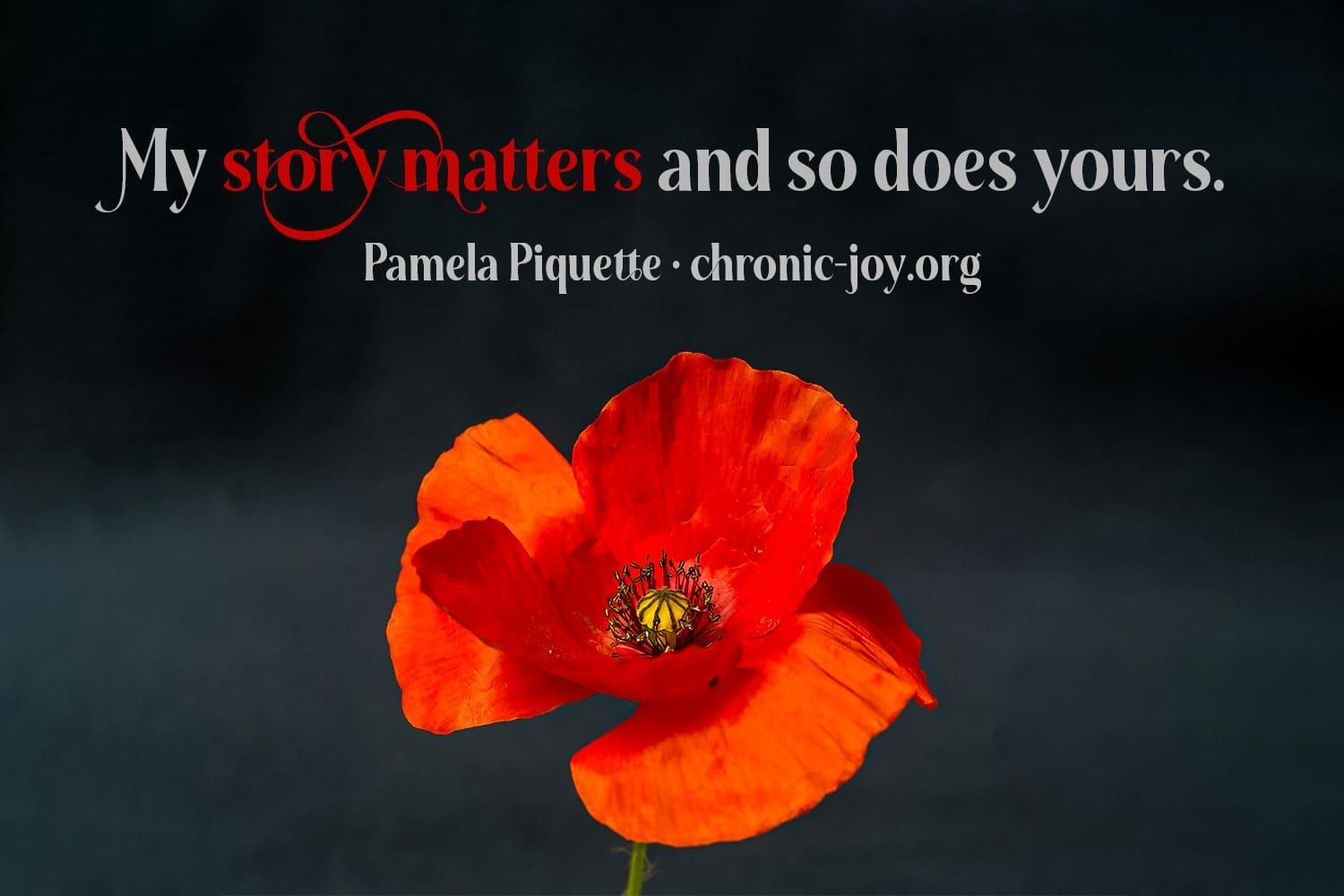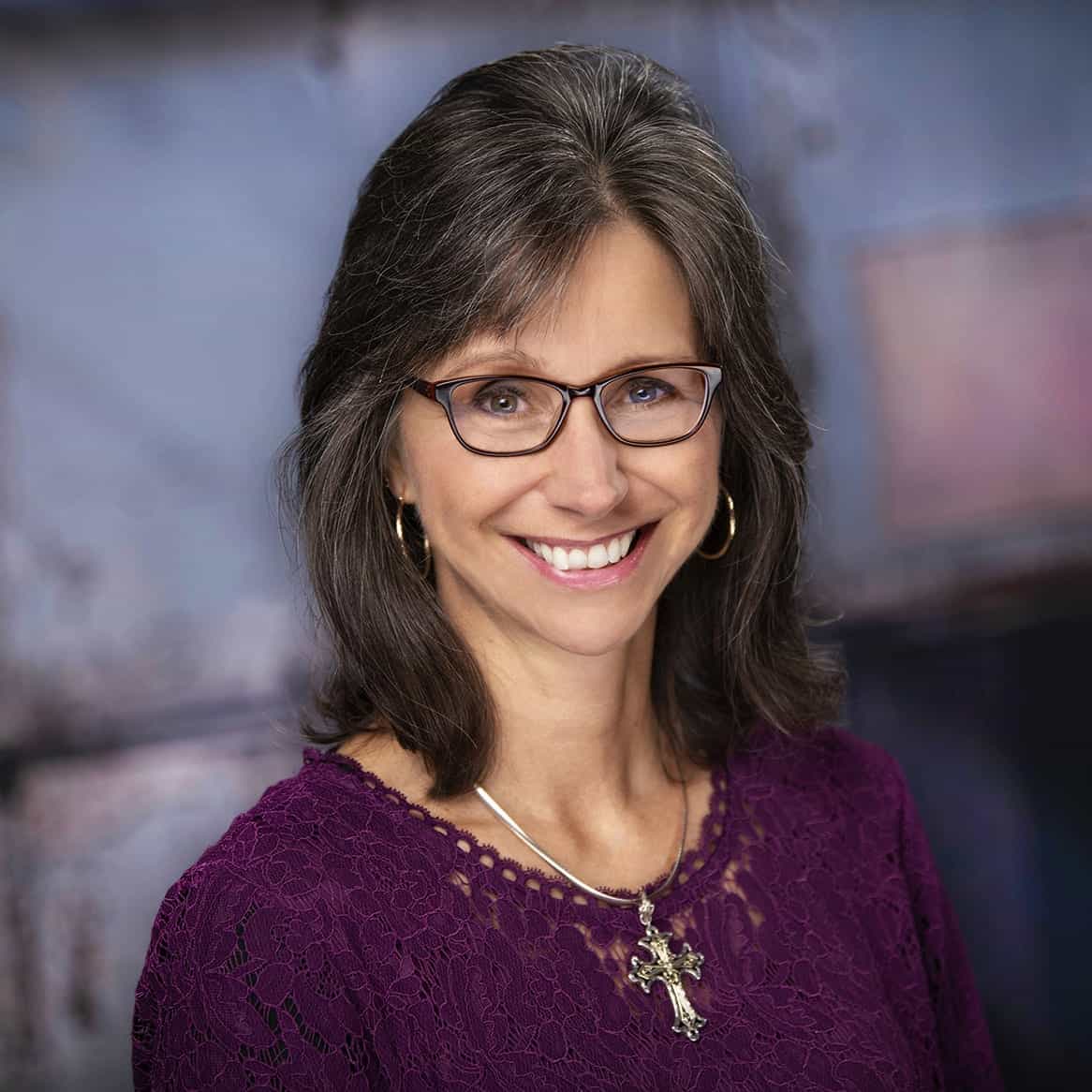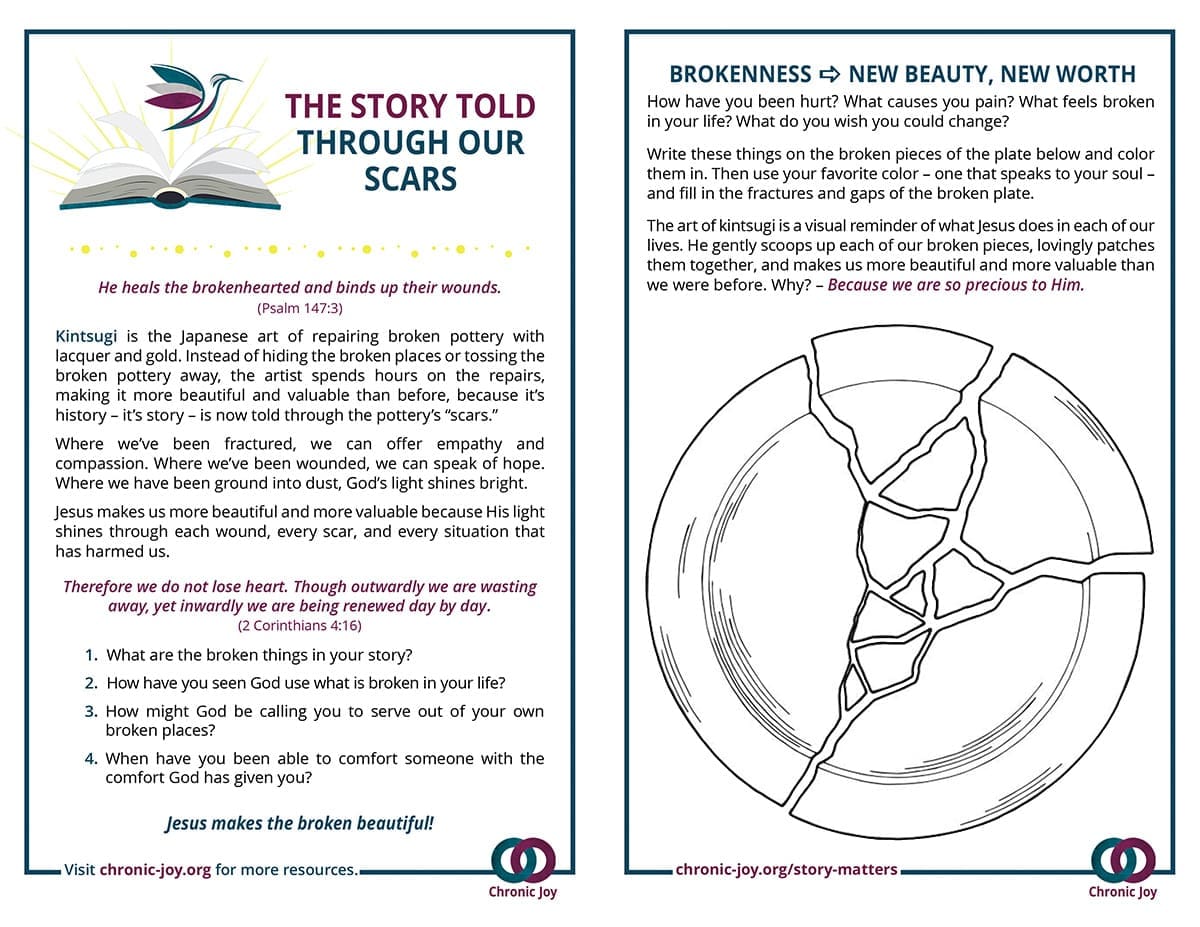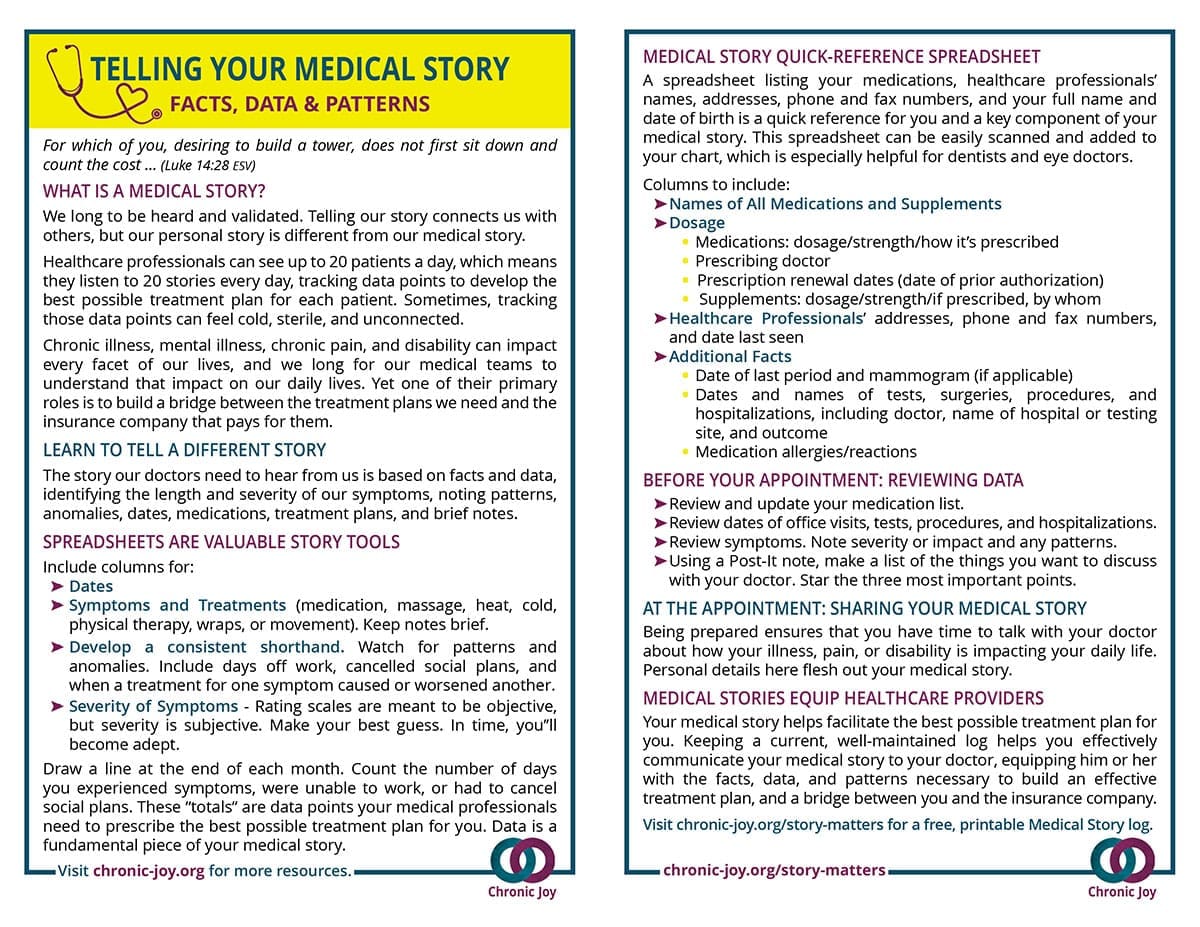
MY STORY
My long-awaited appointment with my new neurologist finally arrived. I had compiled puzzle pieces from many boxes corresponding to my myriad symptoms. I was prepared to tell my story and discover what could be done to help me feel better.
My doctor asked question after question, which I tried to elaborate on and share the implications and impact I felt. Yet the doctor shut me down each time I tried to add my story. I left that appointment very frustrated, but my husband understood that the doctor was gathering data to uncover my medical narrative, not my personal narrative. After several more appointments, this doctor miraculously sorted the pieces of six separate puzzles into their respective boxes. Then, she referred me to other doctors who could help me with those symptoms.
Armed with my validated medical narrative, I began sharing this story with friends and family who simply asked how I was feeling. I shared diagnoses, implications, medications, and details that caused their eyes to glaze. These dear ones merely asked for my personal narrative and how God was working in my life.
BIBLICAL STORY
The Bible contains God’s personal and historical story. I struggle to read the genealogies because they are simply long lists. (My doctor, however, could read those same facts and discover great insights.) The Psalms, often speaking in images and similes, tell personal, creative stories. Proverbs, chronological histories, and the epistles help me step into God’s story.
Many of us have devoted much time to understanding our medical narratives. Sadly, we don’t often take the same time and effort to ask generous questions of ourselves to discover our story through God’s eyes.
PERSONAL NARRATIVE
My personal narrative often begins: “I moved fourteen times before I was sixteen.” I’ve said those words hundreds of times, but in recent years, I have started to unravel the implications, not of moving, but of the trauma of not having a single adult or friend who wanted to hear my story or validate my feelings. My emotions were unwelcome, as were my too many words. I had no idea I was desperately trying to be heard, nor that my too many words only widened the chasm. I was regularly instructed that little girls were to be seen and not heard.
As a child, I had no concept that my life was atypical. Layer upon layer of trauma caused deep-rooted fears: I grew afraid of making even a simple mistake, I knew overwhelming anxiety about maintaining a confident façade, and I harbored an ever-vigilant need to feel safe. Carrying these fears caused me to hide my true feelings; eventually, I lost the ability to feel, express, or identify my emotions.
LEARNING TO EXPERIENCE AND EXPRESS EMOTIONS
Losses piled up, and the list of chronic illnesses and anxiety took their toll. When my father died, everyone offered condolences and encouragement to grieve my loss in my own way, to sit with my feelings. Yet I had no idea what it meant to experience those emotions. That little girl inside me was not allowed to express her feelings.
I have learned to equate grief with a deep paper cut. After the initial bleeding or shock, the cut oozes a bit (like the tears I might shed). Eventually, a scab forms that protects the wound, offering a measure of healing and respite from pain. The scab then uncovers soft new skin that allows final healing.
Peeling away the layers of my personal story causes pain and oozing, but it brings peace as I discover compassion for the little girl I once was. I can be curious about my past without judging my actions. This encourages me to be kinder and gentler to myself about who I am today.
Counseling provides a framework for unpacking the trauma, the hard, and the pain. As my neurologist validated my physical symptoms and developed my medical narrative, therapy validates my experiences, feelings, emotions, and losses, allowing me to hold space for curiosity, compassion, kindness, and forgiveness.
My story matters, and so does your story.
SHARING OUR STORIES
Before we share our stories with others and wrestle with how vulnerable we might want to be, it makes sense to know our stories and do the hard work (like keeping a diary of our medical issues for our medical narratives).
Discovering our personal narratives helps us journal our feelings, explore our stories with God, grieve our losses, and celebrate our victories. Journaling can help us look deeper, discovering our God story. His comfort and compassion for me are the very comforts I can extend to that little girl who struggled to feel loved and heard so long ago – and to others along my journey today.
FREE STORY PRINTABLES
Need a little inspiration to think about your story? Our FREE story printables offer a wide range of ideas and questions to get started. I invite you to choose one and let it guide your thoughts, prayers, and journal notes. May you see the wonder of what God has been doing in and through your life.
QUESTIONS TO PONDER
- If you’ve ever had a doctor’s appointment that left you frustrated, consider how you might navigate future appointments differently (consider only the things within your control—not what you’d want the doctor to do differently).
- What in your personal narrative have you allowed to define you? Prayerfully bring this to Jesus, asking Him to give you His eyes to see who you really are.
- Journal a part of your story that you’d be comfortable sharing with others.
PRAYER
Thank you, Lord, that my story is part of Your story. Every detail of my life (the good and the hard) is safely held in Your hands. Please give me the courage to see my story through a lens of hope and renewal, accepting the past that cannot be changed. Amen.


Pamela Piquette
Executive Director and Co-Founder of Chronic Joy®
Pamela, a leader and a visionary following God's call to inspire those affected by chronic illness, mental illness, and chronic pain, believes that every precious life impacted by illness is both vital and purposed.
Pamela is a wife of more than 35 years, the mom of three married children, and a grandma of six. She is diagnosed with chronic migraines and other chronic conditions. She enjoys baking sourdough bread and chocolate chip cookies, drinking hot tea, being outdoors, and reading (almost always more than one book at a time).

The Story Told Through Our Scars
Where we’ve been fractured, we can offer empathy and compassion. Where we’ve been wounded, we can speak of hope. And where we have been ground into dust, God’s light shines bright.

Telling Your Medical Story
What is a Medical Story? In order for our healthcare teams to build the best possible treatment plans for us, we need to learn to keep well-maintained logs with symptoms (and their severity), medications, treatments, dates, and brief notes. Keep track with our Medical Story Log.

Recent Comments